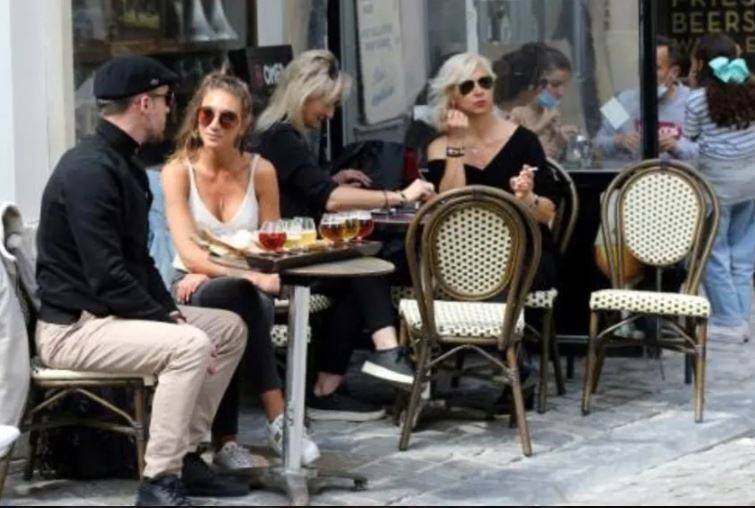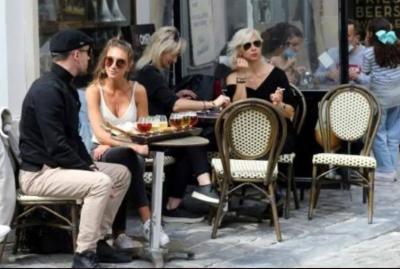European countries, led by Spain, continue their gradual return to "normal life" while doubts linger about their vaccination strategy against COVID-19 after announcing they would not renew their orders for the AstraZeneca vaccine. The European Union has not renewed its contract for additional doses of the AstraZeneca vaccine beyond June, as announced on Sunday by European Commissioner Thierry Breton. This statement left uncertainty about whether this decision indicates a definitive rejection of the AstraZeneca vaccine. He said, "It’s not over yet, stay tuned," adding that "we have begun" renewing contracts with Pfizer/BioNTech, but "there will be other contracts."
European Commission President Ursula von der Leyen announced on Saturday a new contract to purchase up to 1.8 billion doses of the Pfizer/BioNTech vaccine. She added, "More contracts and other technologies will follow." The contract with the German and American labs involved in producing the vaccine stipulates deliveries starting this year and extending to 2023. French President Emmanuel Macron heightened uncertainty when asked by the press about the fate of the European contract with AstraZeneca. He stated during the opening of the conference on the future of Europe in Strasbourg that the AstraZeneca vaccine "will help us out of the crisis." He added, "But to respond to the variants of the virus, we see that there are other vaccines today that are more effective," referring to the "pragmatism" that the EU has consistently shown regarding vaccines. Experts from the European Medicines Agency are set to visit Russia on Monday to inspect the Sputnik V vaccine production facilities, which have not yet been authorized in the EU despite Hungary beginning to use it.
### Winds of Freedom
As vaccination campaigns intensify, several European countries began lifting some restrictions imposed for months over the past weekend in hopes of curbing infection numbers. The winds of freedom blew on Sunday as Spain lifted its state of health emergency, allowing residents to finally leave their areas or gather in the streets in the evening. In several cities across the country, cheers, clapping, and music erupted at midnight Saturday as the restrictions that had been in place since October came to an end, along with the curfew in most areas. Oriol Corbilla, 28, who took to the streets of Barcelona like hundreds of other young people, said, "It feels like New Year's Eve." He added, "We are regaining some of our normal life and freedom, but we must keep in mind that the virus is still present."
In the UK, Prime Minister Boris Johnson is expected to confirm on Monday the easing of pandemic-related restrictions, based on the improving health situation, as announced by his media office on Sunday. In Germany, over seven million people who have been vaccinated are now benefiting from the easing of strict health measures, allowing them to gather and enter any shop without presenting a negative test, unlike the current situation for all other citizens, except for "essential" stores such as grocery shops and pharmacies.
### La Scala Theatre Opens to the Public
In several cities in Bavaria, southern Germany, bars and restaurants are opening their outdoor areas on Monday. Similarly, in Milan, northern Italy, La Scala Theatre is reopening to the public on Monday. The Mediterranean island of Cyprus will also reopen its borders on Monday to vaccinated tourists arriving from 65 countries.
In India, the situation remains dire. For the first time since the pandemic began, the country, which has a population of 1.3 billion, recorded a daily record of over four thousand deaths and 400,000 new infections, though experts believe these official figures are much lower than the reality on the ground. Soumya Swaminathan, chief scientist at the World Health Organization, remarked on Saturday that the Indian variant of COVID-19 is one factor contributing to the virus's extremely rapid spread in India, as it is more contagious and lethal and exhibits greater resistance to vaccines compared to the original virus strain. She stated that combating the outbreak in India is an extremely challenging task "because the pandemic spreads among thousands of people and multiplies at a rate that makes it very difficult to stop," warning that vaccination alone will not be sufficient to regain control of the situation. India, the world's largest vaccine producer, has so far administered both doses to only 2% of its population.
In the United States, White House health advisor Anthony Fauci stated that the actual number of COVID-19 fatalities in the country is undoubtedly higher than the official count of 581,751 deaths since the beginning of 2020, making it the most affected country by the virus in the world. In Tunisia, a new lockdown began on Sunday for the entire week of Eid al-Fitr, as hospitals struggle with a surge in COVID-19 cases. Tunisian authorities warned on Friday that the health sector is at risk of "collapse" due to the increasing influx of patients to hospitals.




